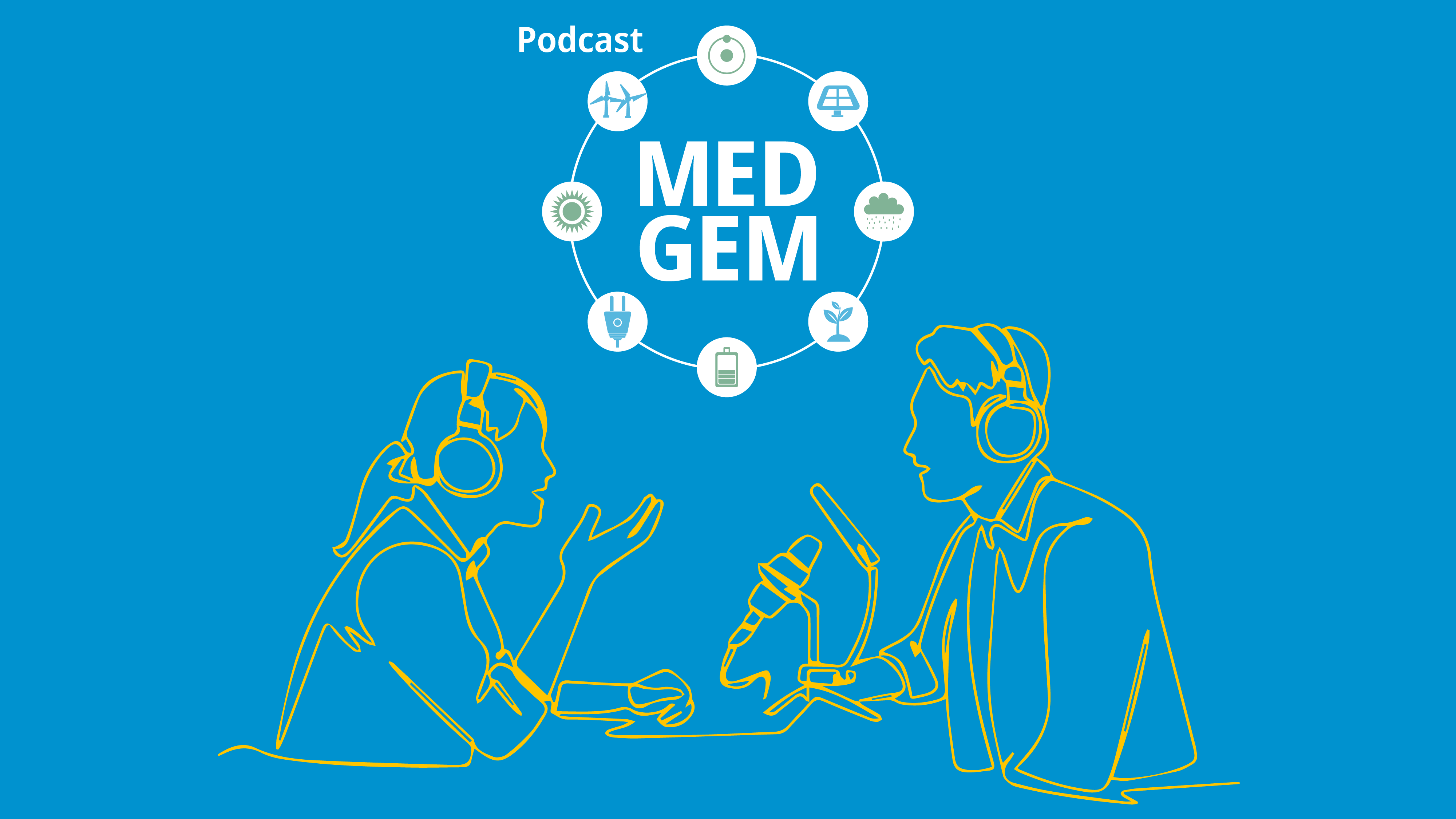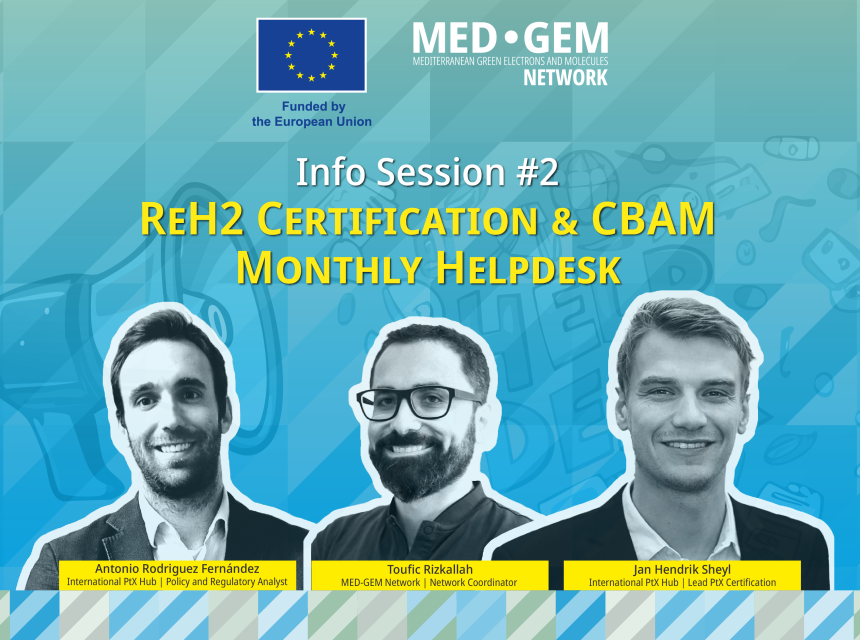The MED-GEM First Helpdesk info-session decoding Europe’s Green Trade Frontier : the Evolving Framework of ReH₂ Certification and CBAM
Helpdesk second-session of March 25th 2025
As the global energy transition accelerates, the European Union’s Carbon Border Adjustment Mechanism (CBAM) and renewable hydrogen (ReH₂) certification schemes are emerging as foundational instruments to align trade with climate ambition. On March 25, 2025, the MED-GEM Network convened stakeholders from across the Mediterranean region for its second monthly info session—a high-resolution snapshot of how regulatory design, market incentives, and cross-border cooperation are reshaping the trade-energy-climate nexus.
Convened virtually and moderated by Toufic Rizkallah, MED-GEM Network coordinator, the session gathered National Focal Points, Country Correspondants and European Commission representatives from DG MENA, DG ENER and DG TAXUD, focused on three pillars: Helpdesk feedback from March, the implications of the EU’s Clean Industrial Deal for CBAM, and a strategic e-learning offer on hydrogen certification by the International PtX Hub.
A Regulatory Compass in Motion
Antonio Rodriguez Fernández, EU Policy & Regulatory Advisor at International PtX Hub, opened with an appraisal of CBAM’s current phase: transitional, flexible, and learning-oriented. With 17 questions submitted to the helpdesk in March - predominantly on CBAM rather than ReH₂ certification—Fernández noted that clarity remains elusive for many stakeholders.
Two key question clusters emerged. The first centers on CBAM’s foundational logic-scope, timeline, and legal instruments. The second concerns the technical methodology for emissions accounting, which leans heavily on the EU ETS framework but is widely perceived as opaque. Fernández emphasized that some aspects remain under development via delegated acts, underscoring the importance of ongoing engagement and institutional adaptation.
Notably, the Clean Industrial Deal - though non-binding - is shaping market expectations. Misunderstood as legislation, it is in fact a strategic communication intended to guide future EU initiatives. It signals likely future incentives for low-carbon products, but no current obligation to procure hydrogen-based inputs. This delineation is crucial for exporters and policymakers alike.
The Omnibus Shift: Burden, Incentive, and Trade Facilitation
A centerpiece of the session was Fernández’s granular walkthrough of proposed CBAM amendments under the EU’s "omnibus simplification package." These proposals aim to reduce administrative burdens without compromising climate integrity. Chief among them:
- A New Import Threshold: The original €150 value threshold is replaced by a 50-ton annual import threshold - targeting administrative relief for SMEs while maintaining emissions coverage for 99% of imports.
- Sectoral Exemptions: Hydrogen and electricity are excluded from the new threshold due to concentrated, high-volume imports.
- Deferral of Certificate Purchases: The CBAM financial obligations are shifted from 2026 to 2027, without altering the regulatory timeline - providing breathing room for market actors.
Further proposed changes would relax verification requirements for importers using default emissions values, create flexibility in carbon pricing deductions, and refine reporting procedures.
These technical adjustments, though subtle, could significantly affect trade flows. The logic is simple but powerful: reduce compliance friction for low-emissions, small-scale importers while preserving the environmental integrity of the mechanism.
ReH₂ Certification: A Quiet Revolution in the Making
Jan-Hendrik Scheyl, Sustainability & Certification Advisor at International PtX Hub, addressed the questions surrounding ReH₂ certification - a topic that received only two inquiries last month. But far from being a secondary concern, Scheyl stressed that certification is pivotal to unlocking EU market access for green hydrogen producers.
One particularly insightful question came from the field: what happens if renewable and fossil ammonia are blended? Scheyl explained the mass balance approach, wherein certification can remain valid so long as input-output ratios are transparently tracked. The complexity of such questions illustrates the need for greater capacity-building at the company level.
To this end, Scheyl introduced the International PtX Hub’s free online course on hydrogen and PtX certification - available via GIZ’s Atingi platform. Aimed at emerging-market stakeholders, the course provides foundational knowledge of certification pathways, mass balance systems, and chain-of-custody models.
Peer Learning and South-South Cooperation
As Toufic Rizkallah, MED-GEM Network Coordinator, emphasized in closing, regional collaboration is the cornerstone of success. While March saw participation from Morocco, Palestine, and Lebanon, broader involvement from other partner countries is essential.
One participant suggested creating a shared repository of helpdesk Q&As. Rizkallah confirmed that MED-GEM is preparing a consolidated knowledge report, to be disseminated at the end of the semester - a promising step toward institutional learning.
A Strategic Inflection Point
The session offered a synthesis of regulatory detail and market foresight. What emerged was a vision of the Mediterranean as a co-architect—not merely a passive recipient—of Europe’s decarbonized trade framework. With CBAM and ReH₂ certification gaining granularity, now is the time for exporters, governments, and investors to master the rules of engagement.
The energy transition, it turns out, will be certified.


